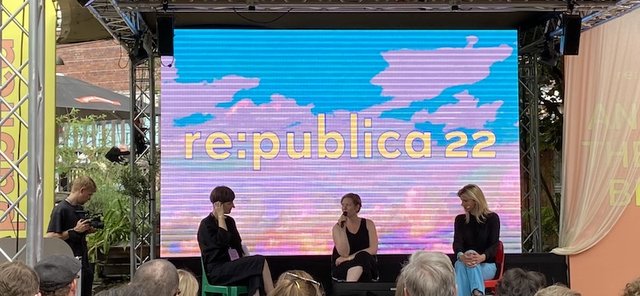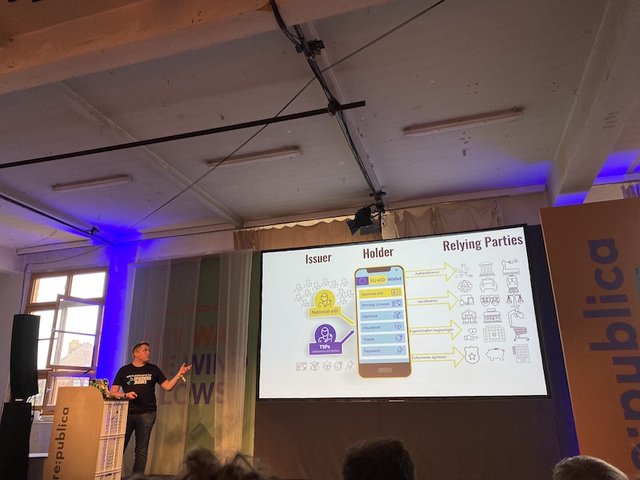Re:publica-22 brought together people from all across the Internet community and civil society to address current challenges to the future of the open Internet. In this article, I share some of my personal highlights from the digital festival.
As usual, the start of summer has seen several big events taking place all exploring Internet-related issues at the intersection between the technical and civil communities. Some of these events have already been covered on RIPE Labs - e.g. EuroDIG, RightsCon, WTDC-22 - but of those that haven’t, there’s one that especially stood out to me for its eye-opening presentations and discussions.

Re:publica is a festival for digital society. This year’s event – re:publica 22 – took place from 8-10 June in Berlin with a program packed full of fascinating talks in a mix of German or English. I had the opportunity to join for the duration of the event and listen in on presentations that I found important and interesting both for me personally and for the RIPE community in general. As you'll see, speakers approached the event as an opportunity to call attention to many of the serious issues the Internet as we know it faces today. There was much focus on recent upheavals, proposals, and practices that pose very real threats to the future of, and public trust in, the open Internet.
This isn’t the first time I’ve attended re:publica. In 2018, I joined the conference to talk about Governing the Internet Infrastructure. But with the COVID gap behind us, it was good to be back at what turned out to be another vibrant iteration of the festival. Here are some of my personal highlights.
Highlights
The future is de-growth
This panel focused on questions such as: How can anyone believe that continuous growth is realistic? How can we have indefinite growth on a limited and finite planet? How can we change our behaviour without creating a recession? Since the 70’s, many dedicated people worked on treaties to save the planet. But none of them have worked. In fact, the situation is now a lot worse.

Discussing these issues in depth at re:publica were economist and author Maja Göpel and transformation researcher Andrea Vetter. Maja’s talk built on the idea that the way economics is taught today is very wrong, one major problem being that progress is usually equated with economic growth. Looking back at the cybernetics model from the 70’s, Maja raised questions about how much energy we actually need, and looked at how discussions on the issue usually skirt around questions of fair distribution of resources. We need to compare less and share more, but no political party has an appetite for that. There is too much focus on egoism and individualism.
Andrea emphasised the need for socio-economical tax reform and an end to such practices as subsidising fossil fuel industries. The conversation touched on the need to include everyone in the discussion, avoiding an "us" and "them" mentality, and to call out "bullshit" narratives like "Yes, we can easily de-couple growth from destroying resources" or "Growth, progress etc. is going to trickle down" or "What’s good for finance is good for our economy". What we need is different business models.
The EU and net neutrality
Thomas Lohninger of Epicenter.works was also at the RIPE 84 Cooperation Working Group to speak about the proposal by ETNO that calls for content providers to contribute to the costs of the digital infrastructure operated by their members and its entirely negative implications for net neutrality. At re:publica, he doubled down on his message that operators really need to speak up now in response to this.
Looking back at earlier moves to introduce zero-rating offerings and actions taken by large Telcos and the EU on this front in the past, Thomas looked at the ETNO plan to adopt a sending-party-pays approach. His argument here again was although the proposal fits the kind of business model telcos are used to, it represents a huge risk for the global interconnection of the Internet and will have bad consequences for IXPs, small operators, and users. Fighting this will call for alliances between tech and civil society.
The Russian network on the way to isolation and lack of freedom
Alexey Yusupov, expert at the Friedrich Ebert Stiftung, dived into the recent history of the Russian Internet and the tipping point that came about in 2011 when the Russian government started to look at the Internet as a threat quite different from any faced during the Cold War. The Internet allowed information to be distributed a lot more easily than ever before, and the government simply didn’t have the same level of control in the digital world that it had in the analogue world, so they set out to change this.
Today the Russian government is still carrying out a whole range of measures both technical and psychological to maintain control of the Internet. For example: Russian ISPs have to report everything about their infrastructure to the government; the government frequently uses spyware; there is targeted suppression and censorship, and even attacks against international companies. It was interesting to hear that the speaker said it would be a bad idea to block networks in Russia as it would only help the government to achieve their goal faster.
Orwell's wallet: How the EU's eID system paves the way to surveillance capitalism

Another talk from Thomas Lohninger here. A current reform of the eIDAS regulation from 2014 comes with the ambitious goal of rolling out digital identities across the EU. The idea would be to create a European digital identity wallet (most likely a smart phone app) for identifying and authenticating anyone (personal and business) in a secure way. A motivation is to take away control from commercial and US big tech and to provide a European alternative, the current aim being to achieve 80% usage by 2030!
But the plan raises lots of questions. Who issues the data? Who verifies it? Who uses it? Having every user’s behaviour stored on one server will lead to unique lifelong identifiers. A super cookie! In some EU countries this is currently illegal. There are real risks in terms of privacy, and the approach has all sorts of potential disadvantages for the elderly, the poor, and the digitally illiterate. Thomas’s talk elaborated these and other dangers and emphasised a need for pseudonymity or anonymity.
State Hacking
Andre Meister of netzpolitik.org made a strong argument that the trade and use of state hacking tools should be forbidden. The global market for hacking tools has exploded in recent years, with many companies out there offering services in this area. In addition to this, governments develop their own tools with the aim of targeting drugs and fraud. But the reality is that there have been many cases where the use of these state hacking tools has spilled over to friends and family.
The impact of state hacking tools has been huge. At least 180 journalists, numerous human rights activists, and 15 presidents worldwide have been targeted through the use of the NSO group’s Pegasus tool alone. State hacking represents a severe breech of privacy. And, as a reaction to this, the US is sanctioning NSO and other similar companies. Apple and Meta are starting law suits against NSO. In addition to that, the speaker called on governments not to abuse zero day vulnerabilities.
Privacy problems with police databases
Ingo Dachwitz of netzpolitik.org reported that police have access to a lot of data. The police in Berlin, for instance, have access to 130 different databases. And although this access to data is required to solve crimes, it has also proven very tempting. In around 100 reported cases each year, police men and women have been found to be using the access they have for personal reasons. And that’s only the known cases. A real problem here is that there are hardly any pro-active controls and hardly any consequences. Also, there are tens of thousands of wrong or erroneous or old data sets in those police databases. In Germany, the data protection office cannot enforce controls against the police and other institutions. That has already led to a warning by the EU.
That's a list of just six of the talks I was able to attend. There were others too that really made an impression on me, such as Frederike Kaltheuner's excellent presentation on Fake AI. And while I couldn't see everything, there were lots of other sessions I would have loved to have gone to, like the panel on Open Source and Open Data where Fiona Krakenbürger (now committee member of the RIPE NCC Community Project Fund) spoke.
Re:publica continues to be an inspiring and energetic event for bringing together the technical community with civil society. I look forward to taking part again in the future.



Comments 0
The comments section is closed for articles published more than a year ago. If you'd like to inform us of any issues, please contact us.